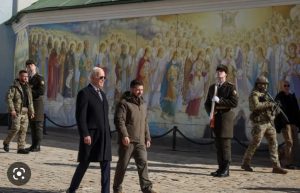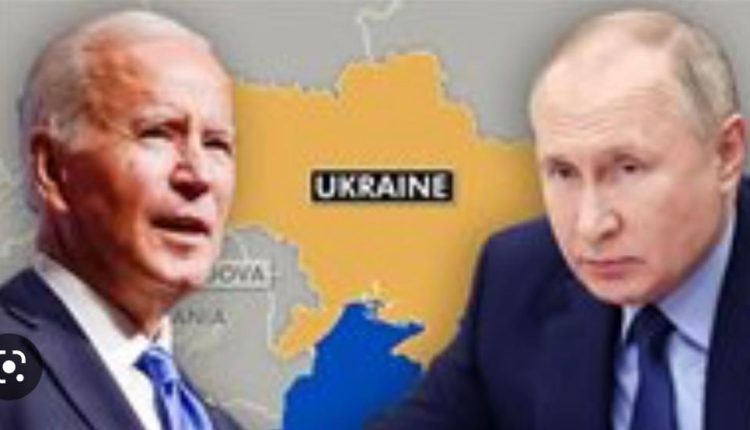THE PLANET IS AT AN IRRATIONAL CORNER: Will the “Alpine Seismic Belt Divides Push for Negotiations?

By General Monzer El Ayoubi
Translation: Dr Pierre A. Sarkis

Last February, former US President Donald Trump commented on the policy and performance of the current US Administration with regard to the Russian-Ukrainian file, saying: “Biden’s actions and his policy towards Ukraine are pushing humanity towards a Third World War.” Despite his wildness, racism and sometimes extremism in speech and behavior, the man is in charge, and during his presidency he proved to practice remarkable pragmatism to the extent of controlling the rhythm of decision-making institutions, and even distinction from them.
Following President Biden’s visit to Kiev last week to reaffirm his country and NATO’s support for President Volodymyr Zelensky and Ukrainian troops, Trump did not hesitate based on his cowboy genes, to announce in front of a gathering of his supporters in Florida that “if he is re-elected president of the US, he will immediately call Russian President Vladimir Putin and the Ukrainian President, and arrange a summit meeting to resolve the situation around Ukraine as soon as possible. In a clear Republican harmony, the visit did not discourage Florida Governor Ron DeSantis with most Republican elected officials from continuing his criticism, calling for Biden to be held accountable for the way, and limits of the huge financial grants that put pressure on the lives of American taxpayers in light of high prices and waves of inflation that may get out of control at any moment.
In a related context, President Trump and a bloc of members of Congress consider that sending more advanced American weapons to Kiev, including modern missiles and battle tanks, as well as, preparing for a new sanctions package, did not deter the Russian Federation from pursuing its operation. From an intuitive electoral standpoint compatible with a strategic vision identifying with some Pentagon leaders, he believes that “Biden has put his country on the path of destruction and should not succeed in a second term.”
On the ground, as the military operation of the Russian Army enters its second year, the data confirm the prolongation of the conflict, whether in terms of the movement of forces and their position on the fronts, or in light of what has been achieved and is being accomplished of the strategic goals set, especially in light of the unprecedented Western military support for the Ukrainian Army that continues systematically and at a high pace in quantity and quality. At the same time, the Russian forces are continuing their preparations for the decisive moment (the expected Spring offensive) with the aim of achieving qualitative steps to stabilize their lines and follow up the progress while trying to capture the axes and important points, as well as, retake many areas to the East. This means that the horizon remains blocked in the way of solutions and good diplomatic endeavors, and this is reflected in President Biden’s visit to Kiev.

In the Ukrainian tragedy, the visit of the American President came in the form of a theatrical drama par excellence, regardless of the Russian leadership’s knowledge of it as a matter of preventive coordination in its secrecy and anonymity, in an unprecedented manner 48 hours before the departure of the presidential plane Air Force One from Andrews Air Force Base towards the Polish capital Warsaw, and then heading by train to Kiev. In addition, the camouflage game was adopted as in issuing the agenda of the White House without noticing the visit, and the President going out to dinner with his wife to one of Washington’s restaurants before departure, would not have preserved the prestige of Great America, nor the leader of the free world according to analysts, despite the justification announced under the cover of security reasons. The intelligence context also seemed superficial and futile when Reuters revealed that sirens went off across Kiev with Biden’s visit, noting that there was no news of a missile attack at that time.
On the other hand, in response to the eroding popular support based on opinion polls, which puts President Biden at stake in an awkward position in front of his constituents and the institutions of the deep state, who has risked a huge amount of his political capital in supporting Ukraine- the value of aid in its diversity has reached “one hundred billion dollars” until now- the timing of the visit days before the first anniversary of the invasion had its impact. It was a symbolic connotation that it needs and a firm message to the Kremlin in its practical non-diplomatic content, that the US and Allied support for Ukraine continues in the face of “authoritarian expansion” especially after the announcement of a new military aid package that includes air defense systems: the Patriot Missile Air Defense System, the Javelin 148 Anti-Tank Missile System, Precision Artillery Batteries (smart missiles- Joint Direct Attack Munitions JDAMs), and the M1 Abrams heavy tanks. In addition to the continuing support to Kiev, the foreign ministers of the G7 Group announced after their regular meeting in Munich and a discussion by German Chancellor Schulz, and according to what was leaked from the inner circles of the conference, that they would maintain and strengthen sanctions, as well as, “call on other countries to stop providing assistance to Russia.”
From the conference hall, and against the backdrop of a historic tragedy by the use of nuclear weapons, the Japanese Foreign Ministry declared that: “The irresponsible nuclear discourse of the Russian Federation is unacceptable, noting that its use will entail serious consequences” which are also based on the tense cumulative situation in Southeast Asia and the South China Sea “regarding the Island of Taiwan, and North Korea’s development of ballistic missiles capable of carrying nuclear warheads, etc.” US Secretary of State Anthony Blinken added to the statement issued at the end of the meeting: “The meeting opposed unilateral attempts to change the status quo in the Indo-Pacific Region through force or coercion.”
As the military operation enters its second year, the West sees nothing but the success of its bet on Kiev’s resilience, even if by a certain amount in the face of the Russian hordes, which will push it to more of a challenge and escalation of the Ukrainian fire. In the midst of the frantic conflict, the planet today stands at an irrational East-West corner, and out of fear, the rate of fire spreading into Western Europe and NATO countries is high. Perhaps the catalyst to push for the negotiating table is the movement of the Alpine Seismic Belt, extending from the Southern edge of Eurasia to the shores of the Atlantic Ocean in the West of the European Continent. Unfortunately, humanity does not move and jump over its conflicts and wars except in the face of nature, and what we have witnessed in Regional and Arab solidarity after the February 6 earthquake that struck Turkey and Syria, is a good example.
Beirut, 02/03/2023
Scholar in Security and Strategic Affairs

